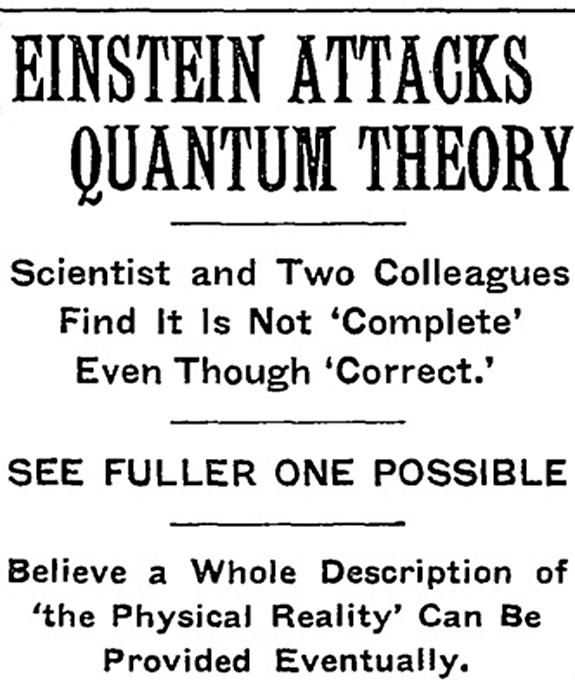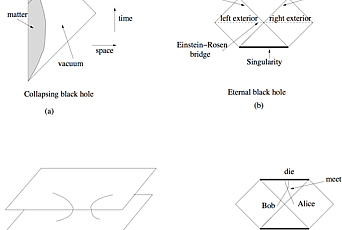The Advent and Fallout of EPR

"Einstein Attacks Quantum Theory” read the New York Times headline of May 4, 1935. The article continued:
Professor Albert Einstein will attack science’s important theory of quantum mechanics, a theory of which he was a sort of grandfather. He concludes that while it is “correct” it is not “complete.” With two colleagues at the Institute for Advanced Study here, the noted scientist is about to report to the American Physical Society what is wrong with the theory of quantum mechanics. The quantum theory with which science predicts with some success inter-atomic happenings does not meet the requirements for a satisfactory physical theory, Professor Einstein will report in a joint paper with Dr. Boris Podolsky and Dr. N. Rosen.
Two years after he joined the Institute’s Faculty, Einstein coauthored the referenced paper “Can Quantum-Mechanical Description of Physical Reality be Considered Complete?” with Podolsky and Rosen, generally referred to as EPR. Einstein had recruited Podolsky and Nathan Rosen as Members of the Institute in 1934. In a letter dated November 10, 1933, to Abraham Flexner, the Institute’s founding Director, Einstein described Podolsky as “one of the most brilliant of the younger men who has worked and published with [Paul] Dirac.”
In his application to the Institute in February 1934, Rosen (writing in the third person) described his interest in studying fundamental problems of physics.
While it is true that a year is a short time when one is working on such problems, it is hoped that it may at least serve to provide him with a satisfactory start along the lines mentioned so that he may be able to continue the work afterward. Although the applicant is interested in independent research, he would like to carry on his work in contact with Prof. Einstein, who has kindly given his consent.
According to the late physicist Asher Peres, whose Ph.D. thesis adviser was Rosen (with whom Einstein later built the Einstein–Rosen bridge in general relativity):
One day, at the [Institute’s] traditional 3 o’clock tea, Rosen mentioned to Einstein a fundamental issue of interpretation related to entangled wave-functions. Einstein immediately saw the implications for his long-standing disagreement with [Niels] Bohr. As they discussed the problem, Boris Podolsky joined the conversation, and later proposed to write an article. Einstein acquiesced.
In the winter of 1935, just prior to the publication of the EPR paper, Dirac (a Member at the time), Einstein, and Oswald Veblen (a fellow Institute Professor), wrote letters of recommendation on Podolsky’s behalf to Louis T. More, Dean of the Graduate School of the University of Cincinnati, where Podolsky soon was appointed Assistant Professor of Mathematical Physics. On March 20, 1935, Einstein wrote:
I am happy to be able to tell you that I estimate Podolsky’s abilities very highly. His clear mind enables him to express every matter in the field of physics in a clear and original way. In addition, he is an independent investigator of unquestionable talent. I have just finished a piece of research with him and another colleague, and have had ample opportunity to learn to appreciate Podolsky’s knowledge and ability.
Podolsky, in fact, penned the EPR paper, which quickly became a centerpiece in the debate over the interpretation of quantum theory, a debate that continues today. Einstein wasn’t thrilled with the approach taken by Podolsky, who submitted the paper to Physical Review on March 25. In a letter dated June 19, 1935, to Erwin Schrödinger, Einstein wrote, “For reasons of language this [paper] was written by Podolsky after several discussions. Still, it did not come out as well as I had originally wanted; rather, the essential thing was, so to speak, smothered by the formalism [gelehrsamkeit].”
Podolsky went on to commit a grave blunder, in Einstein’s view, when he leaked the advance report of the EPR findings published by the New York Times. The newspaper subsequently printed a statement by Einstein, in which he stated that the information “was given to you without my authority. It is my invariable practice to discuss scientific matters only in the appropriate forum and I deprecate advance publication of any announcement in regard to such matters in the secular press.” According to Peres, Einstein was so upset by Podolsky’s indiscretion that he never spoke with him again.


